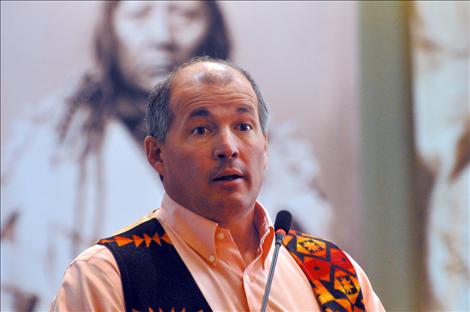Members speak against county, schools reimbursement
Hey savvy news reader! Thanks for choosing local.
You are now reading
1 of 3 free articles.
PABLO – In 2014’s second quarterly meeting of tribal council, tribal members spoke out against the possibility of the Confederated Salish and Kootenai Tribes reimbursing Lake County government for revenue that will be lost once the tribes take control of Kerr Dam in September 2015.
Though the Tribes received the green light earlier this year to purchase the dam, there are many details that must be worked through before the acquisition is finalized, said Brian Lipscomb, CEO of Energy Keepers, Inc. Energy Keepers is a corporation created by the Tribes to manage the dam. One major question that remains is whether or not the Tribes will reimburse Lake County, Polson School District, and Bigfork schools for approximately $1.3 million in property tax revenue that will be lost once the dam changes hands from a private tax-paying entity, to a tribal corporation that is exempt from paying taxes.
“Obviously we need to contemplate whether or not it would be wise to continue a payment-in-lieu of taxes,” Lipscomb said. “ … Really it’s a decision of whether or not we want to continue to support those services.”
Several members weren’t supportive of continuing payment. Lois Friedlander said she would like to see the Tribes invest the money back into tribal services might help combat social problems on the reservation.
“I would really like to see some of those funds channeled into rehabilitation centers and … not public education, but tribal education for our students here, birth through college,” she said. “I think that given all the social ill that we have, if we invest those monies we can make more of an impact getting our people healthy rather than passing those monies onto entities that I don’t think have the best interest of our people in mind.”
Director of Tribal Health and Human Services Kevin Howlett suggested evaluating the situation year by year if any agreement is made, instead of agreeing to a long-term commitment. An arrangement of that nature would give the Tribes leverage to make sure the county continues to provide adequate services in return for receiving a payment.
Cathi Dupuis echoed his concerns.
“There’s this expectation that we would voluntarily support these entities that have historically fought against us,” Dupuis said. “What I’m concerned about is that if we do that, will there be an ongoing expectation and no reciprocity?”
Lipscomb said that school and county officials understand the tribes are not obligated to pay the money, and that careful measures are being taken to not establish an expectation of continued support.
“The Tribes are considering it because it provides service to tribal members,” Lipscomb said.
Tribal Council has final say on authorizing the funds. If the Tribes opt to not pay local school districts, the districts may be able to qualify for federal impact aid dollars to make up the difference. The county does not have that option.
No council members voiced their opinions on the matter during Lipscomb’s presentation.
















